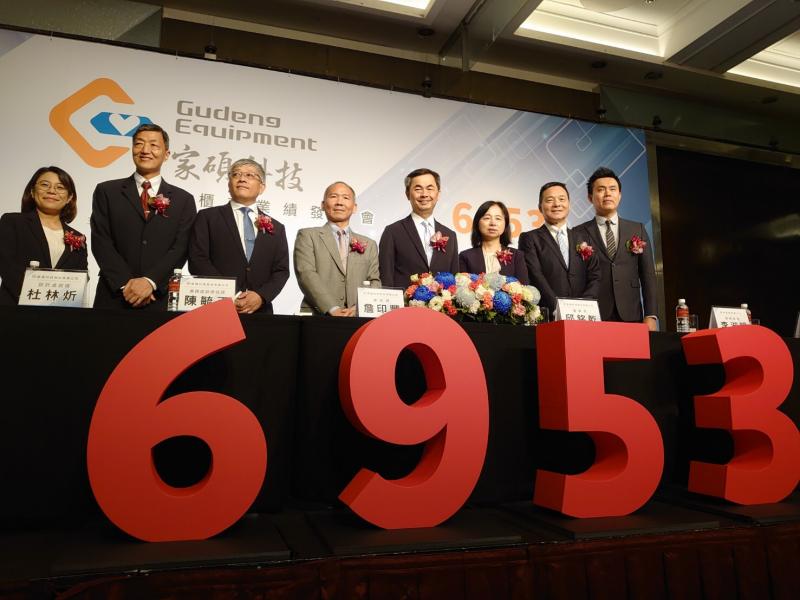Gudeng Equipment Co Ltd (家碩科技), a supplier of semiconductor equipment and components used in advanced chip manufacturing processes, yesterday said it has tentatively set a price of NT$216.8 per share for its debut on the Taipei Exchange next month at the earliest.
The price represents about a 15 percent premium compared with the auction price of NT$188.52 a share, which was based on the average trading price of the company’s shares on the Emerging Stock Market over a 30-day period before the auction.
Investors would be able to buy Gudeng Equipment shares through an auction or via subscription. Yuanta Securities Co (元大證券) is underwriting the initial public offering (IPO).

Photo: CNA
Gudeng Equipment offers automotive extreme ultraviolet lithography (EUV) pod surface inspection tools, a critical tool for EUV pod quality management.
Gudeng Equipment is 47.19 percent owned by Gudeng Precision Industrial Co (家登精密), the sole EUV pod supplier to Taiwan Semiconductor Manufacturing Co (TSMC, 台積電).
TSMC was the world’s first chipmaker to utilize EUV tools in producing an advanced version of its 7-nanometer chips in 2019 and now on more advanced chips.
Gudeng Equipment gave a bullish view about the company’s business prospects as a significant expansion in capital spending by the world’s major chipmakers on advanced technologies would provide a boon to the company, chairman Bill Chiu (邱銘乾) told investors on Monday.
“We are to benefiting from the AI [artificial intelligence] boom as more companies are joining the ranks of AMD and Nvidia in developing AI chips,” Chiu said.
Global semiconductor equipment spending on front-end facilities is expected to grow 21 percent year-on-year this year to US$92 billion, with Taiwan continuing to be the biggest spender, SEMI has forecast.
For Gudeng Equipment, China is to be a new growth engine as Chinese chipmakers are racing to produce advanced chips, Chiu said.
China accounted for a mere 3 percent of the company’s total revenue last year, while Taiwan contributed about 70 percent and the US 13 percent.
Since a key customer operates chip manufacturing facilities in Ireland, Gudeng Equipment has also started shipping equipment to that nation.
To cope with rising demand, Gudeng Equipment is planning to build a new factory in Tainan later this year, it said.
Gudeng Equipment last year posted a net profit of NT$228 million, up 12.32 percent from NT$203 million in 2022. Gross margin improved to 49 percent last year from 43 percent the previous year.
Revenue grew 15.24 percent year-on-year to NT$1.21 billion last year from NT$1.05 billion.

Taiwan’s long-term economic competitiveness will hinge not only on national champions like Taiwan Semiconductor Manufacturing Co. (TSMC, 台積電) but also on the widespread adoption of artificial intelligence (AI) and other emerging technologies, a US-based scholar has said. At a lecture in Taipei on Tuesday, Jeffrey Ding, assistant professor of political science at the George Washington University and author of "Technology and the Rise of Great Powers," argued that historical experience shows that general-purpose technologies (GPTs) — such as electricity, computers and now AI — shape long-term economic advantages through their diffusion across the broader economy. "What really matters is not who pioneers

In a high-security Shenzhen laboratory, Chinese scientists have built what Washington has spent years trying to prevent: a prototype of a machine capable of producing the cutting-edge semiconductor chips that power artificial intelligence (AI), smartphones and weapons central to Western military dominance, Reuters has learned. Completed early this year and undergoing testing, the prototype fills nearly an entire factory floor. It was built by a team of former engineers from Dutch semiconductor giant ASML who reverse-engineered the company’s extreme ultraviolet lithography (EUV) machines, according to two people with knowledge of the project. EUV machines sit at the heart of a technological Cold

TAIWAN VALUE CHAIN: Foxtron is to fully own Luxgen following the transaction and it plans to launch a new electric model, the Foxtron Bria, in Taiwan next year Yulon Motor Co (裕隆汽車) yesterday said that its board of directors approved the disposal of its electric vehicle (EV) unit, Luxgen Motor Co (納智捷汽車), to Foxtron Vehicle Technologies Co (鴻華先進) for NT$787.6 million (US$24.98 million). Foxtron, a half-half joint venture between Yulon affiliate Hua-Chuang Automobile Information Technical Center Co (華創車電) and Hon Hai Precision Industry Co (鴻海精密), expects to wrap up the deal in the first quarter of next year. Foxtron would fully own Luxgen following the transaction, including five car distributing companies, outlets and all employees. The deal is subject to the approval of the Fair Trade Commission, Foxtron said. “Foxtron will be

INFLATION CONSIDERATION: The BOJ governor said that it would ‘keep making appropriate decisions’ and would adjust depending on the economy and prices The Bank of Japan (BOJ) yesterday raised its benchmark interest rate to the highest in 30 years and said more increases are in the pipeline if conditions allow, in a sign of growing conviction that it can attain the stable inflation target it has pursued for more than a decade. Bank of Japan Governor Kazuo Ueda’s policy board increased the rate by 0.2 percentage points to 0.75 percent, in a unanimous decision, the bank said in a statement. The central bank cited the rising likelihood of its economic outlook being realized. The rate change was expected by all 50 economists surveyed by Bloomberg. The